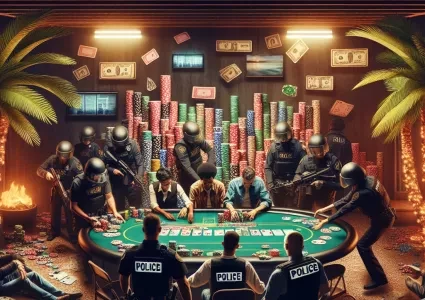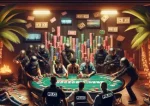
Earlier this month, a covert operation led to the apprehension of five suspects running an underground gambling racket hidden beneath the facade of legitimate businesses in the sunshine state city of Port St. Lucie, Florida. Officers from the local police department masterminded the operation, their objective being to uproot four clandestine gaming circles that were erratically thriving within the city’s boundaries.
These cleverly disguised operations had been running illegal ‘bolita games’; a term originating from Spanish, meaning ‘little ball’. The game, akin to a lottery of sorts, has a conspicuous historic appeal and has been popular in Florida and Cuba. Strangely enough, the suspects were using winning numbers derived from the New York State Lottery; however, their underground lottery network was in no way sanctioned or connected to any government-run lottery.
The suspects nabbed in the operation were identified as Bryant Francisco, Chimy Ismero, Josiane LaPointe, Big John Petion, and Revelyn Tejeda-Serrata. All five were charged with lottery violations and detained at the St. Lucie County jail on May 10th, as reported by the Port St. Lucie Police Department. Upon posting bond, these suspects, now wearing the weight of impending trials, were released from custody, with their cases being handed over to local prosecutors.
This bust was the culmination of a two-month long investigation into illegal gambling within the city, sparked by an anonymous tip-off about covert gambling activities taking place in and around genuine businesses. To substantiate these claims, the local police enlisted the help of an incognito detective from the West Palm Beach Police Department. This individual, a stranger to the suspects, dutifully visited and gambled at each of the four clandestine gaming sites to collect substantial evidence.
“[The participants] would pick numbers, they would number these balls, put them in a plastic bag and just pull them out, like you’d see normally done with the lotto machine on TV,” elaborated PSLPD Chief Richard Del Toro, casting light on the games’ operations. Subsequently, a Florida judge reviewed the copious evidence brought forth and granted search warrants to proceed with the operations.
The subsequent raids were executed with utmost precision by local law enforcement, a SWAT team, Florida’s Division of Alcoholic Beverages and Tobacco, and other agencies. The raids targeted four establishments doubling up as secret gambling dens: Cale Marketplace, Malaika Caribbean Restaurant, Frienz Mini Mart, and Balla Unisex Salon.
Each of the four businesses received citations for illegal gambling, unpermitted use of property, and business tax receipt violations, which could translate into fines up to $15,000 per entity if convicted. The raids concluded, approximately $10,000 in hard cash was seized by officers.
Amid the aftermath, Del Toro revealed that investigations are still ongoing in other parts of the city. He went on to say, “I mean, just the odds of the fact that there’s four separate businesses operating the same type of illegal gambling makes me believe this is probably a problem throughout the city that we’re going to have to look into.”
He further revealed that while these businesses appeared legal, they were participating in illegal, unregulated activities and that there was no guarantee of payout, indicating that some winnings were potentially being deliberately withheld by the owners of these schemes. As the investigations continue and the city awaits the trial of the suspects, it’s clear that the officers’ vigilance has shed light on a hitherto unnoticed problem.
